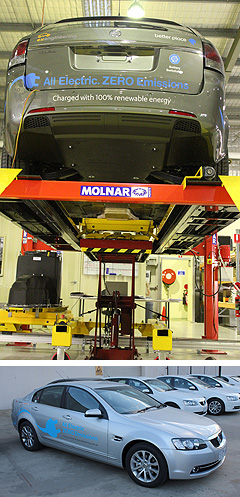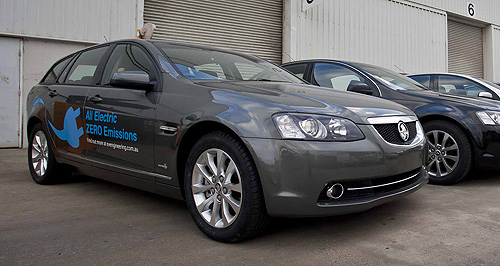News - General News - Electric VehiclesCommodore EV covers 1886km in 24 hoursUtopian: If enough battery swap stations were dotted along the Hume Highway, EV Engineering’s high-voltage Commodore could drive from Melbourne to Sydney in the same time as the petrol version. Swappable battery enables electric Commodore to cover 1886km in 24 hours23 Jul 2012 ONE of seven Holden Commodores converted to run on electricity by Port Melbourne-based EV Engineering covered 1886 kilometres in a 24-hour period this weekend, unofficially breaking the world record for a production EV of 1690km set last month by Renault’s Zoe. While Renault’s effort was set in France using a 30-minute fast charger to top up the battery 18 times, EV Engineering was able to keep the Commodore on the road using the five-minute battery swap system at its workshop, developed with infrastructure provider Better Place. EV Engineering CEO Ian McCleave said the inclusion of a swappable battery pack was among the electric Commodore project’s key criteria. “That’s what got us across the line,” he said. “We were able to quickly switch our depleted battery for a fully charged one, so we didn’t have to park and plug in, in order to recharge. We were able to just drive, switch and keep going.” Overseen by scrutineers from the Society of Automotive Engineers Australasia (SAE-A), members of the EV Engineering team took turns to complete the 122km public road loop between Port Melbourne and Geelong 15 times in 24 hours, starting at 1pm on Saturday, July 21. SAE-A executive director Geoff Peterson said the trial represented an “important milestone in proving the suitability of electric vehicles for the Australian marketplace”.  “It demonstrates Australia’s world class automotive engineering capabilities.” After each loop was completed, the batteries had between 20 and 25 per cent charge remaining before the swap, indicating the driving conditions would yield an average range of 150km. Australia is the third roll-out market for Better Place after Israel and Denmark, where EV infrastructure networks of charging posts and battery swap stations are already in use. EV Engineering’s trial shows that, with regularly spaced battery swap stations along the Hume Highway, for example, EVs could make the 1790km return journey between Melbourne and Sydney as easily as an internal-combustion vehicle. However, the small number of EVs entering the market with swappable batteries is a barrier to this becoming a reality, and getting vehicle manufacturers to adopt the technology and agree on a standard system could also prove problematic. The fleet of seven proof-of-concept Commodore EVs converted by EV Engineering are about to enter the fleets of the company’s backers, which include component suppliers Bosch, Continental and Futuris plus Better Place, Air International and General Electric. Employees of the consortium companies will put up to 50,000km under the wheels of each Commodore EV during an evaluation period that will determine customer reaction and potential demand for a possible future commercialisation of the conversion. Major components including the battery cells, electric motor, transmission and ancillary devices were sourced from overseas, but EV Engineering designed, developed and built most of the control electronics, structural components and the interchangeable battery pack in-house, developing unique, patented technologies along the way. Despite the absence of an internal-combustion engine, EV Engineering designed the driving experience of the electric Commodore to closely resemble the petrol version, maintaining the familiar ignition key starter and gear selector while delivering similar acceleration. The air-conditioning, heating and power steering systems all had to be converted to run on electricity rather than from engine-driven pulleys and Bosch re-calibrated the electronic safety systems, including stability control and anti-lock brakes. Continental supplied a redesigned instrument cluster that shows battery charge status and remaining range, plus a replacement for the rev-counter that indicates how much energy is being used to drive the car or is being regenerated under deceleration. Australia is no stranger to record-breaking EV runs, having hosted the 2009 Global Green Challenge in which a Tesla Roadster travelled 501km on a single charge at an average speed of 40km/h.  Read more19th of July 2012  Electric Holden Commodore good to goMelbourne-based EV Engineering sets seven electric Commodores free in fleet trial9th of December 2011  Bosch looks offshore to remain viable in AustraliaCar parts giant Bosch drawn to EVs as local industry woes put it in holding pattern11th of November 2011  Blade does a runnerESC laws force local electric vehicle producer to switch from cars to commercials31st of October 2011  BMW batteries for electric CommodoreHolden Commodore EV prototypes to employ the same battery tech as BMW’s i3 and i827th of June 2011  Fleet boost for electro-CommodoreAustralia’s biggest fleet car buyer signs up with electric Commodore project |
Click to shareGeneral News articlesResearch General News Motor industry news |
















Facebook Twitter Instagram